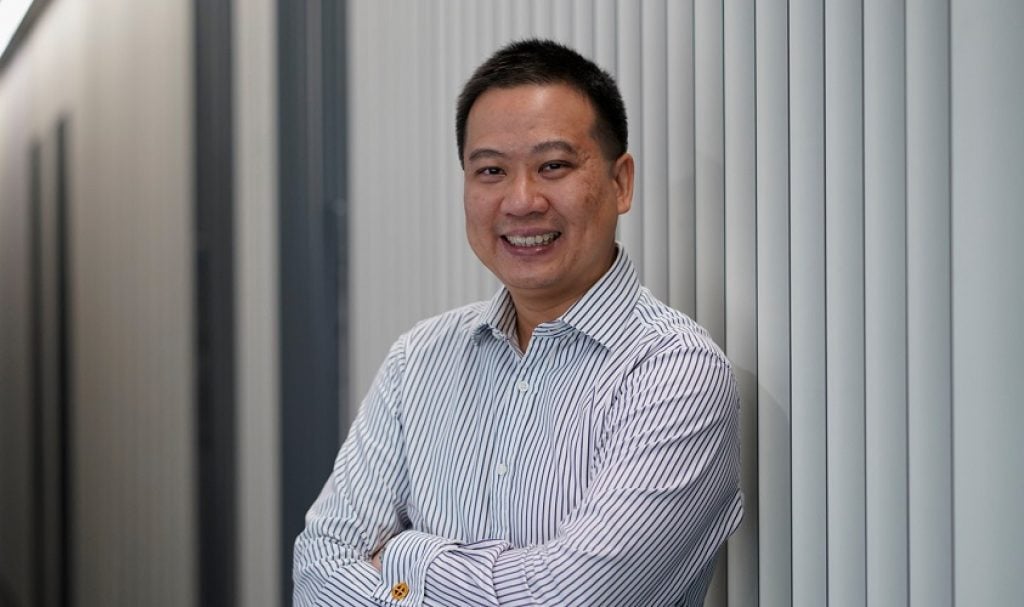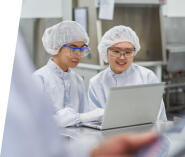With recent advances in our ability to characterise and understand the human gut microbiome, medical scientists are gaining exciting insights on how the microbial ecosystem in our digestive tract impacts human health—from gut health to virtually every aspect of health and wellbeing.
These insights are now paving the way for new treatments, including precision medicines that are tailored to an individual’s unique microbial makeup, as well as clinical lab services and technologies that will be useful for both research and clinical care.
As co-founder and CEO of AMILI, Southeast Asia’s first precision gut microbiome company, Dr Jeremy Lim is helping lead efforts to bring microbiome research to the Asia Pacific region and expand access to microbiome services that are suited for Asian populations.
Lab Insights recently spoke to Lim to learn more about how he got into microbiome research and what’s in store for the future. While his company and the broader field of microbiome science are still young, these trends may have growing implications for laboratory medicine in the coming years.
From public health practitioner to startup founder
Prior to founding AMILI, Lim already had a long and decorated career in medicine and public health. Even so, the concept of the microbiome and its implications didn’t cross his radar until relatively recently.
“Five years ago, I didn’t know the term ‘microbiome’, but now it’s the most exciting field for me,” he says. Around 2019, Dr David Ong and Dr Jonathan Lee—AMILI co-founders who were both then with the National University Hospital (NUH) in Singapore—highlighted to him the state of the science and the outstanding research being done in North America and Europe.
Drs Ong and Lee had been part of the NUH team that had performed the region’s first microbiome transplants back in 2014, but the pace of research and discovery since then had been modest in Singapore and Southeast Asia. The three ultimately founded AMILI to bring this type of work to Asia Pacific.
“We realised how important local and regional solutions were and how very little was being done, particularly in multi-ethnic Asia,” Lim reflects. “We decided that despite being nerdy university professors, forming a start-up was the fastest and most nimble way to change this.”
Alongside his work at AMILI, Lim still holds a post as Director of the Leadership Institute for Global Health Transformation at the Saw Swee Hock School of Public Health, part of the National University of Singapore. He also writes and lectures regularly about public health topics (see his popular RED 2021 presentation on Precision Public Health for one example of the many initiatives he is driving).
As AMILI gains traction, however, he is increasingly focused on the microbiome as a key area where he intends to drive impact.
Why the gut microbiome matters
AMILI was founded on the premise that the human gut microbiome—the collection of bacteria, viruses and fungi that inhabit our intestines and other parts of the digestive tract—holds the key to many potential aspects of human health.
With the advent and growing availability of bacterial 16S rRNA and shotgun (deeper and more comprehensive) sequencing, microbiome research has exploded in recent years. It has shown the incredible diversity of the gut microbiome across individuals. Estimates suggest that we only share 20-30% of our microbiome, as opposed to 99.9% of our genes.
Microbiome research has also shown how strongly the microbiome affects health and may be implicated in disease. It impacts metabolism, such as leading to vastly different glycaemic uptake between identical twins [1]. It modulates the endocrine system [2], behaviour [3] and the immune system [4], and it is linked to the development of neurodegenerative disease [5].
Given this impact, researchers and clinicians are increasingly looking at using the microbiome to tailor treatments [6,7]. A landmark study in 2013 also demonstrated the benefits of faecal microbiota transfer (FMT) to treat recurrent clostridium difficile infection [8]. The FMT process, which involves transferring healthy human donor stool to someone with this condition, appears to have utility for a variety of other health conditions too.
“The microbiome becomes a very natural place to start asking ourselves how we personalise foods, supplements and medicines so that we are optimised for good health,” notes Lim. He thinks that in the near future, we may be able to match donor and recipient microbiome profiles, just as we do today for stem cell transplants and other procedures.
With increased understanding, FMT may even lead to breakthrough treatments in previously poorly managed diseases. As one example, Dr Lim and colleagues have published a striking case study of a patient with ADHD who no longer had symptoms after FMT [9].
Precision gut microbiomics—by Asians, for Asians
AMILI aims to build a full library of the gut microbiota in Asia, foster research and expand the availability of treatments like FMT in the region. It currently provides services for Singapore, Malaysia and Thailand and will soon roll out in the Philippines, Vietnam and Hong-Kong.
In July 2022, the company raised $10.5 million in a Series A funding round led by life sciences and technology investor Vulcan Capital (now called Cercano Management), a fund founded by the late Microsoft co-founder Paul Allen. Among the investors joining the round were Emtek Group, Capital Code, Pureland Group, Blue7, Pruksa Group, TVM Capital Healthcare, and Enterprise Singapore’s investment arm SEEDS Capital [10,11]. This has bolstered the company’s growth. AMILI now has 30 employees across 4 countries.
AMILI is also collaborating with the National Cancer Centre of Singapore on a large cohort study to identify predictive factors for liver cancer using longitudinal sampling of the microbiome coupled with machine learning algorithms [12]. Dr Lim hopes the results of this study will lead to greater appreciation of the microbiome in the medical community.
Bringing these innovations to Asia and elsewhere, however, will not be without challenges.
For starters, understanding the microbiome is no easy task. Consisting of roughly 100 trillion bacterial cells, the gut microbiome is incredibly diverse, far outnumbering human cells in the body. And with more than 1000 species containing millions of genes, it dwarfs the complexity of the human genome.
Lim also notes that the field still struggles to determine what exactly makes a healthy gut microbiome. Research has already shown that genetics, diet, environment, habits and even exposure to social factors and behaviours play a role in its composition. This adds to the complexity of understanding it.
Dr Lim also acknowledges that it will take time for microbiomics to get the widespread clinical recognition it deserves, including by addition to medical curricula. Patients may be unwilling to engage in microbiomics treatments due to stigma around potentially sensitive topics like stool sampling and FMT. Funding for research and commercial activities, whilst much improved in recent years, also remains limited.
Implications for clinical labs
Over time, however, the field will likely gain greater acceptance in Asia, especially if advances in microbiome research yield even more findings that lead to clinically validated interventions. This opens the door for new services that clinical labs can offer.
Patients on long-term medication or treated with multiple drugs, for example, may eventually have their microbiome profile routinely sequenced to determine whether they are good or poor responders. With even more analytics, it may become possible to optimise or even predict the best treatment regiments.
Although sequencing technology has been relatively commoditised, microbiome genetics material extraction from stool samples is highly complex and a rigorous extraction process is necessary. “In AMILI, we trialled multiple extraction techniques and finally developed our own which we then tested for sequencing yield.”
There are also many opportunities for innovation in sample collection and processing in addition to analytics of the sequences. Lim believes that more research is needed to fully mature this process.
“To all the labs out there, when you jump on the microbiome bandwagon, please pay attention to the extraction process,” says Lim. “Otherwise, your results will be all over the map.”
References:
[1] Berry, S.E., Valdes, A.M., Drew, D.A. et al. Human postprandial responses to food and potential for precision nutrition. Nat Med 26, 964–973 (2020). doi.org/10.1038/s41591-020-0934-0 (https://www.forbes.com/sites/annahaines/2021/07/23/this-diet-is-changing-the-way-we-think-about-nutrition/?sh=3c2d0211312a)
[2] Williams CL, Garcia-Reyero N, Martyniuk CJ, Tubbs CW, Bisesi JH Jr. Regulation of endocrine systems by the microbiome: Perspectives from comparative animal models. Gen Comp Endocrinol. 2020 Jun 1;292:113437. doi: 10.1016/j.ygcen.2020.113437. Epub 2020 Feb 12. PMID: 32061639.
[3] Socała K, Doboszewska U, Szopa A, Serefko A, Włodarczyk M, Zielińska A, Poleszak E, Fichna J, Wlaź P. The role of microbiota-gut-brain axis in neuropsychiatric and neurological disorders. Pharmacol Res. 2021 Oct;172:105840. doi: 10.1016/j.phrs.2021.105840. Epub 2021 Aug 24. PMID: 34450312.
[4] Wastyk HC, Fragiadakis GK, Perelman D, Dahan D, Merrill BD, Yu FB, Topf M, Gonzalez CG, Van Treuren W, Han S, Robinson JL, Elias JE, Sonnenburg ED, Gardner CD, Sonnenburg JL. Gut-microbiota-targeted diets modulate human immune status. Cell. 2021 Aug 5;184(16):4137-4153.e14. doi: 10.1016/j.cell.2021.06.019. Epub 2021 Jul 12. PMID: 34256014; PMCID: PMC9020749.
[5] Fang P, Kazmi SA, Jameson KG, Hsiao EY. The Microbiome as a Modifier of Neurodegenerative Disease Risk. Cell Host Microbe. 2020 Aug 12;28(2):201-222. doi: 10.1016/j.chom.2020.06.008. PMID: 32791113; PMCID: PMC7430034.
[6] Lee JWJ, Plichta D, Hogstrom L, Borren NZ, Lau H, Gregory SM, Tan W, Khalili H, Clish C, Vlamakis H, Xavier RJ, Ananthakrishnan AN. Multi-omics reveal microbial determinants impacting responses to biologic therapies in inflammatory bowel disease. Cell Host Microbe. 2021 Aug 11;29(8):1294-1304.e4. doi: 10.1016/j.chom.2021.06.019. Epub 2021 Jul 22. PMID: 34297922; PMCID: PMC8366279.
[7] Javdan B, Lopez JG, Chankhamjon P, Lee YJ, Hull R, Wu Q, Wang X, Chatterjee S, Donia MS. Personalized Mapping of Drug Metabolism by the Human Gut Microbiome. Cell. 2020 Jun 25;181(7):1661-1679.e22. doi: 10.1016/j.cell.2020.05.001. Epub 2020 Jun 10. PMID: 32526207; PMCID: PMC8591631.
[8] Terveer EM, Vendrik KE, Ooijevaar RE, Lingen EV, Boeije-Koppenol E, Nood EV, Goorhuis A, Bauer MP, van Beurden YH, Dijkgraaf MG, Mulder CJ, Vandenbroucke-Grauls CM, Seegers JF, van Prehn J, Verspaget HW, Kuijper EJ, Keller JJ. Faecal microbiota transplantation for Clostridioides difficile infection: Four years’ experience of the Netherlands Donor Feces Bank. United European Gastroenterol J. 2020 Dec;8(10):1236-1247. doi: 10.1177/2050640620957765. Epub 2020 Sep 29. PMID: 32990503; PMCID: PMC7724536.
[9] Hooi SL, Dwiyanto J, Rasiti H, Toh KY, Wong RKM, Lee JWJ. A case report of improvement on ADHD symptoms after fecal microbiota transplantation with gut microbiome profiling pre- and post-procedure. Curr Med Res Opin. 2022 Nov;38(11):1977-1982. doi:10.1080/03007995.2022.2129232. Epub 2022 Oct 7. PMID: 36164761.
[10] https://www.amili.asia/media/
[11] https://www.mobihealthnews.com/news/asia/singaporean-gut-microbiome-firm-amili-brings-home-105m-series-funding
[12] https://www.nccs.com.sg/news/research/landmark-study-launched-to-detect-liver-cancer-early-in-singapore






